How Much Does Appliance Repair Cost?
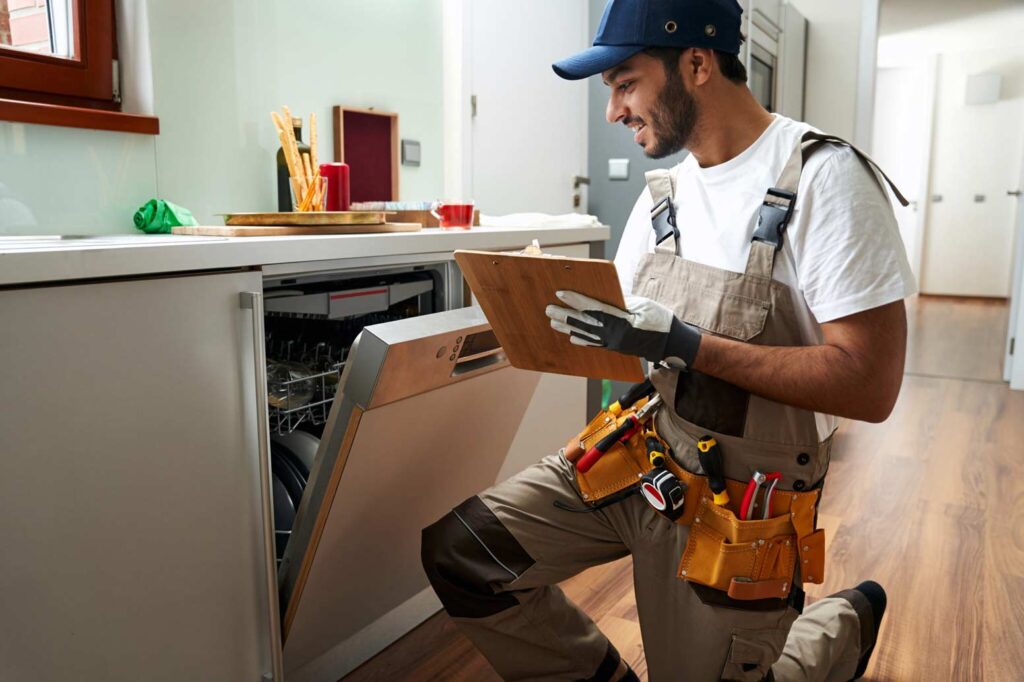
Table of Contents
- What’s the Average Appliance Repair Cost?
- Send Invoices in Seconds
- What Affects Appliance Repair Costs?
- Repair Costs Per Hour: What to Expect
- Should I Repair or Replace?
- How to Save on Appliance Repairs
- DIY Appliance Repair vs. Hiring a Professional
- Cost of Common Add-Ons
- Now You Can Price Appliance Repairs Confidently
- Send Invoices in Seconds
Owning appliances is a game changer for everyday convenience. But when they break, it’s your responsibility to fix them. The first question that comes to mind is often ‘how much does appliance repair cost?’.
Small appliances like toasters and microwaves are often cheap to replace. However, larger ones like refrigerators or washing machines are a bigger investment. And repairing them is unfortunately no different.
The nationwide average cost for appliance repairs is $171. However, depending on the issue, homeowners claim costs can range from $100 to $350. The type of appliance, the problem, and local labor rates all affect the final bill.
In this guide, we’ll walk you through the average costs, what affects pricing, and how to save money. If you’re an appliance repair technician pricing a job, understanding these cost factors is just as important. Accurate estimates help you stay competitive and relevant in your niche.
What’s the Average Appliance Repair Cost?
The average cost of repairing an appliance can range anywhere from $100 to $400. This depends on a few key factors: the type of appliance, the problem, and even your location. For some larger appliances, like refrigerators, repairs can cost even more.
Let’s break it down appliance by appliance:
Send Invoices in Seconds
Set up in 1 minute, send invoices in 2 — it’s that simple with Invoice Fly.
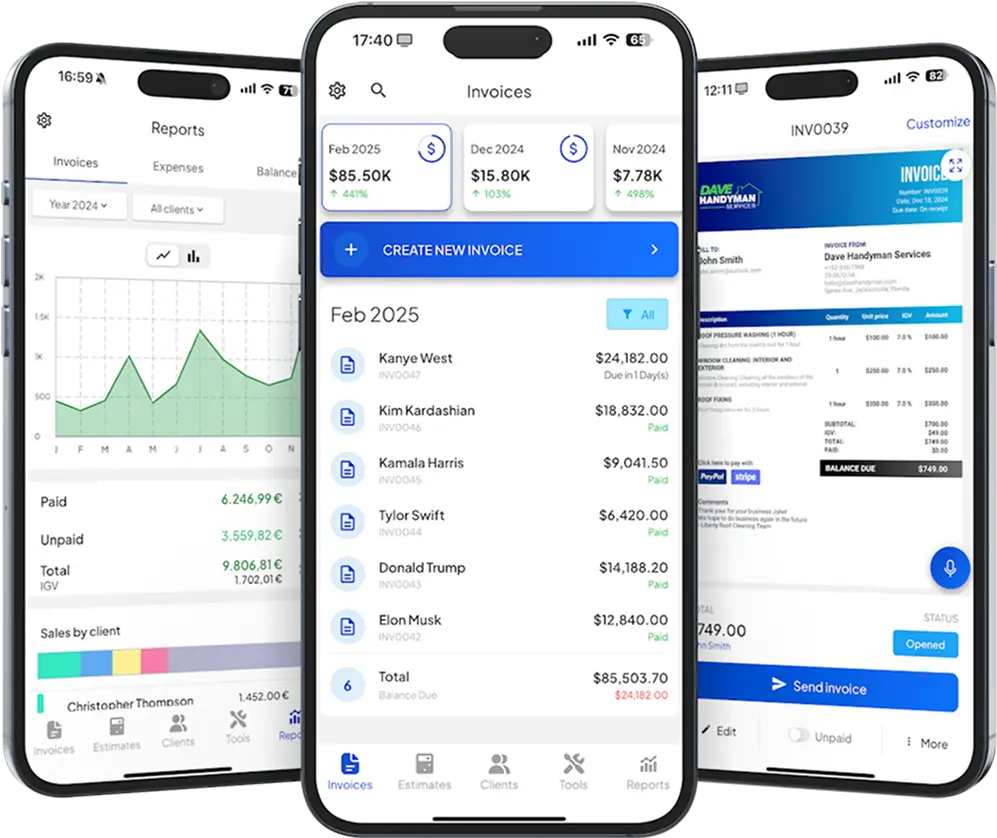
Common Appliance Repair Costs
1. Refrigerators
Refrigerators are often one of the priciest appliances to fix. Repairs typically cost between $150 and $600, depending on the issue. For example:
- A simple thermostat replacement prices around $150.
- A compressor replacement could set you back $500 or more.
2. Dishwashers
Dishwasher repair costs usually range from $100 to $400. Common issues include clogged drains or a malfunctioning motor. If your heating element needs replacing, expect to pay closer to the higher end of the range.
3. Washing Machines
Washing machine repairs can cost between $150 and $350 to fix, depending on the problem. Belt replacements and motor repairs are pretty standard. If the drum or other major components need work, costs could creep up to $500.
4. Dryers
Dryer repairs fall in a similar range as washing machines, from $150 to $400. Heating element issues are common, but a broken belt or motor could increase the cost.
5. Ovens and Stoves
Repairs for ovens or stoves generally range from $100 to $600. Gas ovens tend to cost more to fix than electric ones. A faulty heating element might be an easy $100 fix, but a more complex issue, like replacing the control board, could be much higher.
6. Microwaves
Repairs for microwaves are often cheaper, averaging $75 to $300. If the magnetron or a circuit board needs replacing, you’ll likely pay more.
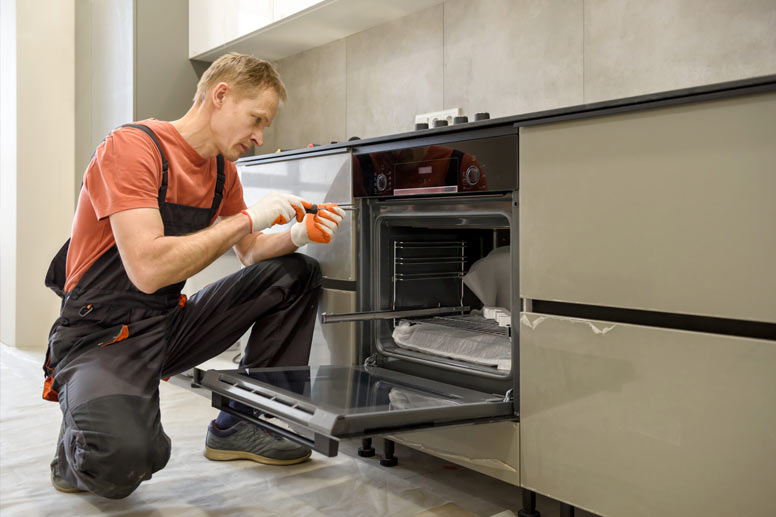
What Affects Appliance Repair Costs?
Several factors can influence how much you’ll pay for appliance repair. Here’s what to keep in mind:
1. Type of Appliance
Some appliances are naturally more expensive to fix than others. For example, fixing a refrigerator usually costs more than repairing a microwave. This is down to the complexity and cost of the parts needed.
2. Severity of the Issue
Minor repairs like replacing a seal or cleaning out a clogged hose, won’t cost as much as major repairs like replacing a motor.
3. Labor Costs
Labor is one of the biggest parts of the bill. Most technicians charge between $50 and $150 per hour. On average, appliance repair costs per hour hover around $100 to $125.
4. Parts and Materials
The price of replacement parts can vary depending on the brand and availability. Some parts are cheap and easy to source, while others (like refrigerator compressors) are expensive and harder to find.
5. Your Location
Where you live plays a role too. Labor rates tend to be higher in larger cities. Rural areas might see lower costs but fewer technicians available.
6. Appliance Age and Brand
Older appliances can be tricky to repair if parts are no longer readily available. Similarly, high-end or specialty brands might come with a higher price tag for repairs.
Repair Costs Per Hour: What to Expect
Most appliance repair companies charge an hourly rate on top of a flat service fee. The service fee — usually between $50 and $100 — covers the cost of inspecting your appliance and diagnosing the issue. After that, the technician will charge their hourly rate for the actual repair work.
On average, appliance repair costs per hour are around $100 to $175. However, for more complex issues or specialty appliances, rates can climb higher.
Should I Repair or Replace?
One of the most common dilemmas is deciding whether to repair your appliance or replace it altogether. Here’s a simple rule of thumb:
- Repair if the cost is less than 50% of what it would cost to replace the appliance.
- Replace if the appliance is over 10 years old or the repair cost is more than half the price of a new one.
If you’re still unsure, consider the overall efficiency of your appliance. Upgrading to a more energy-efficient option might save you money in the long run. For example, the initial investment cost is high but will prevent an older model from eating up unnecessary electricity.
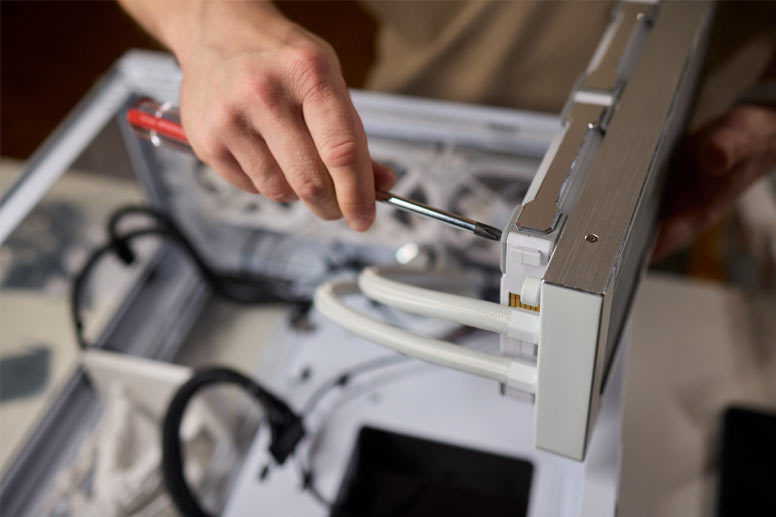
How to Save on Appliance Repairs
Appliance repair costs can add up, but here are a few ways to keep expenses in check:
1. Try DIY Repairs for Simple Fixes
Before calling a professional, see if you can troubleshoot the problem yourself. For example, unclogging a dishwasher drain or replacing a washing machine hose might be easier than you think. YouTube is a goldmine for how-to videos.
2. Shop Around
Get multiple quotes from different technicians. Just make sure they’re licensed and experienced — you don’t want to sacrifice quality for a cheaper price.
3. Regular Maintenance
Staying on top of routine maintenance can help prevent costly breakdowns. Clean your appliances, check for leaks, and replace filters as needed.
DIY Appliance Repair vs. Hiring a Professional
When an appliance stops working, it’s tempting to make a quick fix yourself. While some minor issues are perfect for DIY fixes, others require the expertise of a professional. Knowing which is which keeps you and your appliances in safe hands. Here’s a quick comparison to help you decide:
DIY Appliance Repairs:
- Best for small, non-technical issues like cleaning clogged filters, tightening loose screws, or replacing easily accessible parts.
- Pros: Saves money on labor costs, you have gained the knowledge on how to fix the problem if it happens again.
- Cons: Risk of further damage if you misdiagnose or improperly fix the issue.
Pro Tip: Always check the user manual or a trusted guide before starting.
Hiring a Professional:
- Best For: Complex repairs involving electrical components, motor replacements, or issues with high-end appliances.
- Pros: Ensures proper diagnosis and fixes, often includes a warranty for the work.
- Cons: Higher upfront cost from labor charges and potential service call fees.
If in doubt, a professional evaluation can help determine the scope of the problem. From their professional opinion, you can decide whether it’s worth attempting a DIY solution.
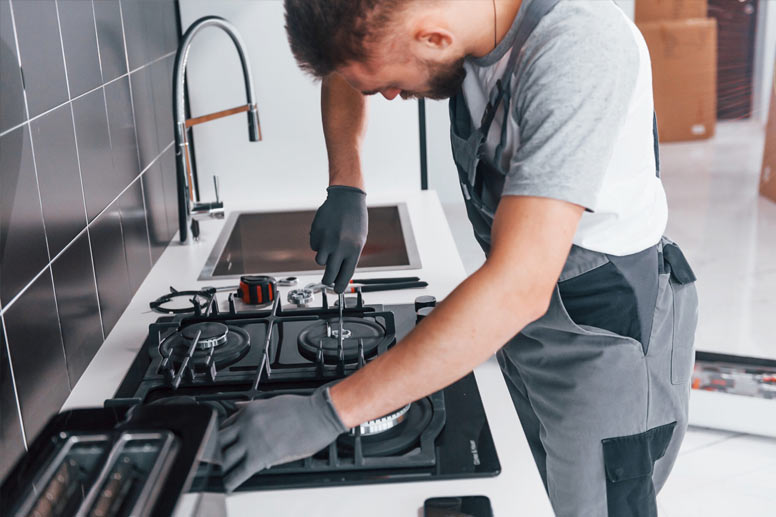
Cost of Common Add-Ons
When repairing appliances and hiring professionals, additional costs for extras can sneak into the final bill. Here’s some of the most common add-ons you should consider:
- Emergency or After-Hours Service:
If you need repairs outside standard working hours, expect to pay an additional $50–$100.
- Warranty Extensions:
Some repair companies offer extended warranties for $20–$50, which can cover future repairs or replacements.
- Delivery and Installation Fees:
For large appliances, technicians may charge $75–$200 for delivery and reinstallation if replacement parts are involved.
- Diagnostic Fees:
Even if you choose not to proceed with repairs, the initial diagnosis often costs $50–$100.
Now You Can Price Appliance Repairs Confidently
Knowing what to expect when dealing with appliance repair costs can save you a lot of stress — and money. Whether you’re dealing with a broken dishwasher or a faulty fridge, understanding the factors that affect costs will help you make informed decisions.
Need help managing your appliance repair business? Explore Invoice Fly’s Appliance Repair Software to simplify invoicing, estimating, and client management today! Get a head start with our free blank invoice template.
RELATED ARTICLES:
Send Invoices in Seconds
Set up in 1 minute, send invoices in 2 — it’s that simple with Invoice Fly.

